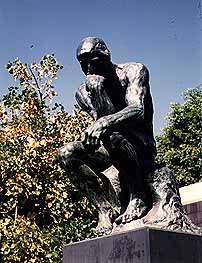
Concept Theory of Existence or, Why Our Existence is Not Absurd or Inexplicable in the Least
All things are concepts. They are conceptual insofar as they satisfy the condition of being an entity. The incidental characteristics: sensory perceivability, apriori or aposteriori, and so on are just that: incidental. They are so, because in order for something to possess any of these characteristics, it must exist as an entity to exhibit said characteristics, and indoingso cannot help but satisfy the sole conceptual condition: that of being an entity. Therefore, all things are concepts, in this manner.
Concepts never change, and they do not spring into existence. They exist independently of wether they are conceived by a mind, because in order to be conceived presupposes its prior existence to the conception. The truth of X=X is not dependent on a mind conceiving it. All things that are a concept, are subject to these rules and hence exist timelessly.
Now, take your existence. All that composes your existence, the external world you perceive daily, the thoughts you think, your awareness, and so forth are all included in your existence. And because your existence, by being referrable, exists as an entity, it is conceptual. Its referral presupposes its existence prior to the referral, in order for it to be referred to. Therefore your existence is a concept.
Consequently, all that you experienced, are experiencing, and will experience existed as a concept prior to your experiencing them. They are all conceptual due to their being an entity of some sort; namely the entity of your experience at a certain point of time, and conceptual rules, including timelessness, therefore apply. You still experience them temporally or in strict order, because that is a characteristic of the concept of your existence. The concept of your existence entails you experience things as you do, and to not, is to not be yourself. Literally.
Imagine the existence of Sherlock Holmes. It exists as an entity, not a physically manifested one, (for the literary Sherlock Holmes never existed), but it is an entity nonetheless and therefore is a concept. If I were to say "Sherlock Holmes, on one brisk morning, decided to drink tea while discussing the morning paper," that would exist as a concept as well; the entity, albeit fictitious, being the event of Sherlock Holmes, on one brisk morning, deciding to drink tea while discussing the morning paper. Now a characteristic included in the concept of Sherlock Holmes' existence, is Holmes' being a human consciousness. So therefore, when Holmes would experience the sensation of "On one brisk morning drinking tea..." he would do so as a human consciousness, because the concept defines him as doing so. And since experiencing something in a human consciousness entails experiencing it as reality and in temporal fashion, Holmes would experience all of this as though it were in reality and in temporal fashion. To this conceptual Holmes, the experience would be as real as your experience is of reading this text. Why? Because the concept is of a Holmes that does so.
This applies precisely to the concept of your particular existence, for a characteristic of this concept is experiencing everything as if it were real and temporal. You feel things as you do, as though they were occurring in a temporal reality, because there is the timeless concept of the characteristics that comprise your existence, including the characteristic of feeling things as though they were occurring in a temporal reality. If I were to transport myself into that Holmesian concept, which defines Holmes as something that perceives things as real, and be perceived by Holmes, would I not seem real to him?
Do the experiences that comprise your existence not seem real to you?
________________________________________
Chris Redman